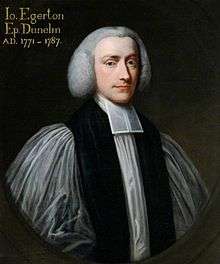John Egerton (bishop)
John Egerton (30 November 1721 –18 June 1787) was a Church of England clergyman from the Egerton family who eventually rose to be Bishop of Durham. As a young man he was associated with the beginning of tourism down the River Wye and later with the controversial appointment of an English monoglot to a Welsh-speaking parish in Anglesey.
John Egerton | |
|---|---|
| Bishop of Durham | |
 | |
| Diocese | Diocese of Durham |
| In office | 1771–1787 (death) |
| Predecessor | Richard Trevor |
| Successor | Thomas Thurlow |
| Other posts | Dean of Hereford (24 July 1750[1]–1756) Bishop of Bangor (1756–1768) Bishop of Lichfield (12 October 1768 {translated}[1]–1771) |
| Personal details | |
| Born | 30 November 1721 St James's, Middlesex, Great Britain[1] |
| Died | 18 June 1787 (aged 65) Mayfair, Middlesex, Great Britain[1] |
| Buried | St James's Church, Piccadilly[1] |
| Nationality | British |
| Denomination | Anglican |
| Residence | Grosvenor Square, Mayfair (at death)[1] |
| Parents | the Hon Henry Egerton (Bishop of Hereford) & Lady Elizabeth Bentinck[2] |
| Spouse | 1. Lady Anne Grey (21 November 1748 {married}–1780 {her death}) 2. Mary Boughton (31 March 1782 {married}–1787 {his death})[1] |
| Children | Amelia Lady Hume John Egerton, 7th Earl of Bridgewater Francis Egerton, 8th Earl of Bridgewater |
| Profession | Church of England |
| Education | Eton College[1] |
| Alma mater | Oriel College, Oxford[1] |
Ordination history of John Egerton | |||||||||||||||||||||||
|---|---|---|---|---|---|---|---|---|---|---|---|---|---|---|---|---|---|---|---|---|---|---|---|
| |||||||||||||||||||||||
| Source(s): [1][3][4] | |||||||||||||||||||||||
Life
John Egerton was the son of Henry Egerton, Bishop of Hereford, by Lady Elizabeth Ariana Bentinck, daughter of the Earl of Portland. After education at Eton College and at Oriel College, Oxford, he followed his father into the church and was ordained priest on 22 December 1745, and on the 23rd of the same month was collated by his father to the rectory of Ross-on-Wye. The rectory at Ross was a favorite residence of his for much of his life, to which he often invited friends and family members. Having had a boat specially made, he began taking his visitors on trips down the River Wye and such was their popularity that they became a regular feature. In consequence Egerton was later credited as "the father of the voyage down the Wye".[5]
Egerton was later made Bishop of Bangor 1756–68, during which time he caused controversy by appointing Thomas Bowles, a priest who spoke no Welsh, to a parish where almost no one spoke English. The case did not come to court until after Egerton had become Bishop of Lichfield (1768–71). Afterwards, having previously declined the primacy of Ireland, he shortly succeeded as Bishop of Durham and held that office until his death in 1787. At Durham he displayed a talent for conciliation in promoting peace and prosperity in the county, which had been divided by elections, and in the city, which had been torn by disputes. He was also a benefactor to the county by encouraging public works: He promoted the enclosure of Walling Fen; assisted materially in rebuilding a bridge over the Tyne between Newcastle and Gateshead; and in 1780 granted a new charter to the city of Durham. In addition, he made extensive improvements at the episcopal palaces and was a liberal supporter of many religious and educational institutions.[6]
Family
Egerton was the eldest son of Henry Egerton, himself a younger son of the 3rd Earl of Bridgewater. On 21 November 1748, he married his cousin, Lady Anne Grey, a daughter and coheiress of the 1st Duke of Kent. They had four children, one of whom died in infancy; the three others were:
- Amelia (1751–1809), married Sir Abraham Hume, 2nd Baronet.
- John William, later 7th Earl of Bridgewater (1753–1823)
- Francis Henry, later 8th Earl of Bridgewater (1756–1829)
Lady Anne died in 1780, and on 31 March 1782, Egerton married Mary Boughton, a sister of Sir Edward Boughton. Egerton died in 1787 and the title Earl of Bridgewater (a subsidiary title of his childless cousin, the 3rd Duke of Bridgewater) later passed to his eldest son in 1803.
References
- "Egerton, John". Oxford Dictionary of National Biography (online ed.). Oxford University Press. doi:10.1093/ref:odnb/8590. (Subscription or UK public library membership required.)
- "Egerton, Henry". Oxford Dictionary of National Biography (online ed.). Oxford University Press. doi:10.1093/ref:odnb/63756. (Subscription or UK public library membership required.)
- Ordination Record: Egerton, John in "CCEd, the Clergy of the Church of England database" (Accessed online, 15 September 2014)
- Ordination Record: Egerton, John in "CCEd, the Clergy of the Church of England database" (Accessed online, 15 September 2014)
- The excursion down the Wye, from Ross to Monmouth, Charles Heath, Monmouth 1808, “On the origin of the excursion”
- "John Egerton", Dictionary of National Biography (1885-1900), Volume 17
Sources
| Wikimedia Commons has media related to John Egerton (bishop). |
- Ellis, Peter Berresford (1994) [1993]. Celt and Saxon The Struggle for Britain AD 410–937. London: Constable & Co. pp. 241–242. ISBN 0-09-473260-4.CS1 maint: ref=harv (link)
| Church of England titles | ||
|---|---|---|
| Preceded by Edmund Castle |
Dean of Hereford 1750–1756 |
Succeeded by Francis Webber |
| Preceded by Zachary Pearce |
Bishop of Bangor 1756–1768 |
Succeeded by John Ewer |
| Preceded by Frederick Cornwallis |
Bishop of Lichfield 1768–1771 |
Succeeded by Brownlow North |
| Preceded by Richard Trevor |
Bishop of Durham 1771–1787 |
Succeeded by Thomas Thurlow |